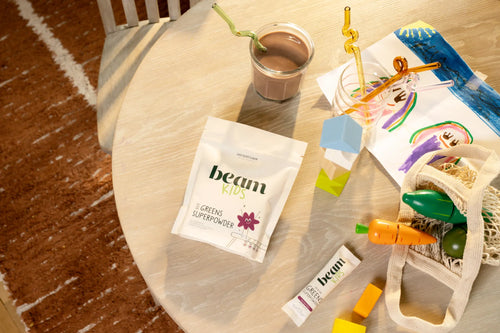by Matt Lombardi
“My body is burnt out and I just don’t feel good, but what can I do about it? I know I need to change my lifestyle, but there’s so much to do in a day. I feel like I can either dedicate myself to making my body feel better, or I can live my life. I can’t do both.”
I hear this all the time—especially as co-founder of a wellness brand. People need more energy, they’re getting sick all the time, they’re in bad moods, they’re not sleeping well, or they’re achy and sore. They think that in order to feel better, they need to make massive overhauls in their lifestyle, but they just don’t have the time (or, ahem, the energy).
As someone who has dedicated his life to helping people optimize their bodies, I know that this simply isn’t true. And as a co-founder, I know that “marginal gains” (AKA baby steps) can affect massive changes. Below, I’ll talk about 5 common things you may be doing that are harming your immune system, causing inflammation, or increasing your stress levels, and easy ways to fix them. I think you’ll be surprised to discover how easy they are—and what kind of a difference they can make in your quality of life.
The Immune System
The immune system is an incredibly complex system that’s designed to protect the body from harmful pathogens and other foreign invaders. It’s made up of various cells, tissues, and organs that work together to defend the body against disease and infection. There are a number of things that can harm the immune system, making it less effective.
1. Exposure to Toxins + Pathogens
Toxins can come from a variety of sources, including pollution, pesticides, and chemicals in your food and household products. Exposure to these toxins can lead to inflammation, which can weaken the immune system. In addition, some toxins can directly damage immune cells, making them less effective in fighting off infections. Pathogens, on the other hand, are things like viruses, bacteria, and fungi, which can cause or worsen inflammation and damage.
Baby steps:
- Purchase natural cleaning products and cosmetics.
- Don’t use plastics, if it can be avoided. This is to help reduce your intake of bisphenol A, a chemical found in some plastics.
- Filter your tap water instead of purchasing bottled. According to a medically-reviewed paper by writer Jeanie Lerche Davis, “Tap water is regulated by the EPA, which requires yearly public reports identifying the contaminants found in local water sources. But bottled water is regulated by the FDA, which has no such requirement.” Use a filter to remove any trace contaminants in tap water.
- Take an extra 15 seconds at the grocery store to ensure you’re choosing organic fruits and vegetables. They may cost a bit more, but it’s worth it.
- Wash your hands often, and be wary of especially dirty surfaces. Pro tip: never put your purse, wallet, or briefcase on kitchen surfaces.
2. Getting less than 7 hours of sleep
According to experts, 7-9 hours of sleep is essential for adults. It’s especially important for the immune system. Here’s why: during sleep, the body produces cytokines, which are proteins that help to fight infection and inflammation. If you don't get enough sleep, your body may not be able to produce enough cytokines. Lack of sleep can also increase the production of stress hormones, which can further weaken the immune system. I truly cannot emphasize enough what an enormous part sleep plays, not only in immune function, but in all systems of the body.
Baby steps:
- Set a time to be in bed. Not a bedtime per se—just a time to wind down, under the covers, with no scrolling.
- Try 1 minute of box breathing before bed.
- Drink the Beam Dream Powder, our best selling hot cocoa for sleep.
Speaking of Inflammation…
Inflammation is definitely a buzzword these days, so let’s dive into what it actually means. Inflammation is the process your body goes through when it needs to defend itself from foreign bodies. In this way, it’s linked to the immune system. However, sometimes your body creates inflammation when it doesn’t actually need it—attacking healthy tissue even when it’s unnecessary.
There are two types of inflammation: Acute inflammation is short-term, and it’s a result of things like bacteria and injury. Chronic inflammation is more long-term, and it can negatively impact the body, causing issues in the gut, heart, and respiratory system, among other things. A huge factor in inflammation? The gut.
3. Neglecting your gut
Your intestines are home to 70% of your immune cells, which is why many people get inflamed after eating certain foods. Simple dietary changes can help reduce the amount of inflammation a person experiences. By avoiding inflammatory foods and adding anti-inflammatory foods such as seeds and nuts to your diet, you’re able to improve the condition of your gut and, ultimately, your health.
Baby steps:
- Reduce or cut out 3 things from your diet: processed meats, sodas, and fried foods. Try it for just one week, and see if it makes a difference in how you feel
- Take a good probiotic and prebiotic every day.
The Kicker: Chronic Stress
Science has revealed the enormous effects stress can have on the body. Stress is a normal part of life, but chronic stress causes the release of stress hormones, which can suppress the immune system and worsen inflammation. This can make you more susceptible to infection, illness, high blood pressure, and heart disease. Stress can be difficult to combat, so I’ve broken it down for you.
4. Multitasking
How many times per day are you doing more than one thing at once? In our rush to get everything done, we often forget the value (and efficiency!) of doing one thing at a time. While it may seem like multitasking is an effective way to increase productivity, it can actually increase stress levels and overwhelm. Instead of doing several things badly, do one thing at a time, well. Ultimately, this leads to better productivity, less do-overs, and less stress.
Baby steps:
- Make a list of the tasks you need to accomplish each day.
- Focus your attention on getting one thing done at a time. Make note of how much more quickly you get tasks done, and your overall stress level at the end of the day.
- If you need a boost, try the Beam Focus pills, our adaptogen blend for calm, focused energy.
5. Not breathing
Check your breath—but not with a mint. Most of the time, in the heat of a busy day, I find myself suspending my breath, or breathing shallowly. When I consciously remind myself to inhale and exhale, I’m astonished at how much better my body feels. I can focus better, I can relax more, and I get more done—leading to less stress.
Baby steps:
- Set a timer for 10AM, 12PM, and 3PM every day. Whenever your timer goes off, take 3 big, deep breaths through your nose.
- If you have a little extra time, try this Wim Hof breathing technique each morning to get your blood pumping.
Remember: baby steps count. Taking these tiny actions each day can lead to massive wins for your physical and mental health.
Reach out to @beam and let me know how these marginal gains impact the way you feel.





